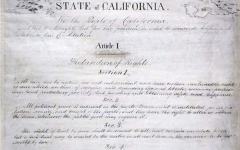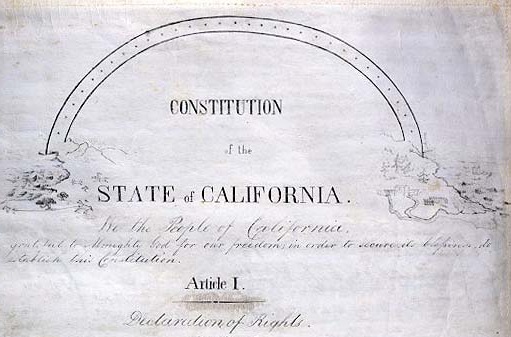
California State Capitol (Photo: Kevin Sanders for California Globe)
Frequently Asked Questions about California Constitution Article IV
Can legislators earn any income from lobbyists?
By Chris Micheli, May 20, 2024 2:30 am
How many sections does Article 4 have? This article contains twenty-eight sections.
What does Article 4 relate to? It relates to the legislative branch of state government.
Who is granted the legislative power in this state? Section 1 vests the legislative powers in the Legislature, which is bicameral with an Assembly and a Senate, but the powers of the initiative and referendum are reserved to the People of the State.
Who comprises the California Legislature? Section 2 provides for the Senate of 40 members elected to 4-year terms and the Assembly of 80 members elected to 2-year terms. Legislators may serve a maximum of 12 years in either house or both. They are elected in November of even-numbered years and must be residents of their district at least one year, a citizen of the U.S., and a resident of California the last three years.
What happens if there is a legislative vacancy? Section 2 requires the Governor to call a special election when a vacancy in office occurs.
When are the sessions of the Legislature? Section 3 specifies the Legislature convenes at noon on the first Monday in December in the even-numbered year and adjourns on November 30 two years later.
Who calls special sessions of the Legislature? Section 3 provides that extraordinary (commonly referred to as “special”) sessions are proclaimed by the Governor and legislators can only legislate on the subject of the proclamation.
Can legislators earn any income from lobbyists? Section 4 prohibits legislators from receiving any salary or earned income from lobbyists or lobbying firms, or anyone with a contract with the Legislature for the past 12 months.
Do legislators get reimbursed for expenses? Travel and living expenses are passed by 2/3 majority votes of both houses of the Legislature. Such expenses may not be received if the Legislature is in recess for more than three calendar days (these are termed “per diem” sessions).
Are pensions allowed for legislators? Section 4.5 requires legislators elected after November 1990 to participate in federal social security and the state pays for that. No other pension benefit can accrue to legislators.
Who determines the election of state legislators? Section 5 provides that the Senate and Assembly judge the qualifications and elections of their members and may expel a member with a 2/3 majority vote.
Are legislators allowed gifts and honoraria? Section 5 states that no legislators can accept any honorarium and the Legislature is required to enact strict limits on gifts. Legislators are prohibited from accepting compensation or taking any other action on behalf of another person before a state agency or board.
Is there a revolving door limitation for legislators? Section 5 provides that legislators are prohibited from lobbying the Legislature for 12 months after leaving office. The Legislature is required to enact laws prohibiting legislators from engaging in activities that conflict with their official duties.
How many legislators are there? Section 6 requires the state to be divided into 40 senatorial and 80 assembly districts with one of each elected to represent each district.
What are the main rules for the Legislature? Section 7 grants authority to each house to choose its officers and rules. A quorum is based upon a majority of members. Each house keeps its own journal and all committees and proceedings are required to be open and public, but closed sessions are allowed for specified purposes, including employment, safety and security, and litigation. Their caucuses may meet in closed session. The rules related to this section must be adopted by a 2/3 majority vote. Neither house can recess for more than 10 days without the other house’s consent.
How much are legislative office budgets? Section 7.5 provides that total spending for the compensation of members of the Legislature may not exceed $950,000 per member. Each year the amount if adjusted by an amount equal to the percentage increase in the state’s appropriations limit.
Are bills required to be in print for a period of time? Section 8 provides that only the budget bill may be heard or acted upon sooner than 30 days after introduction, unless the house dispenses with this rule by ¾ majority vote.
Are there rules for bills? Section 8 specifies that statutes are made by bills. Bills must be read three times in each house, although the rule can be dispensed with by a 2/3 majority vote. Bills cannot be passed unless the amendments have been printed and distributed to legislators. Bills must be passed by a majority vote.
When do statues take effect? Section 8 provides that statutes generally go into effect on January 1 of the following year, except special session statutes go into effect on the 91st day after adjournment of the special session. A statute goes into effect unless a referendum petition affecting the statute is submitted to the Attorney General. This does not apply to statutes affecting legislative districts, statutes calling elections, providing tax levies or appropriations, or urgency statutes that go into effect immediately upon enactment.
What are urgency bills? Section 8 states that urgency statutes are those necessary for immediate preservation of the public peace, health or safety. Bills with urgency clauses must contain a statement of facts constituting the necessity. Urgency statutes cannot create or abolish any office or change salaries, terms or duties, or grant special privileges or vested rights.
Are there rules for ballot measures by the Legislature? Section 8.5 deals with acts amending initiative statutes, issuance of bonds, or constitutional amendments. But they may not include or exclude political subdivisions of the state, or contain alternative or cumulative provisions.
Is there a single subject rule in California? Section 9 requires statutes to embrace one subject which is expressed in its title.
Is there a reenactment rule in California? Section 9 requires a section of a statute may not be amended unless the section is re-enacted as amended.
How does a Governor act on legislation? Section 10 requires each bill passed to be presented to the Governor. It becomes a statute if it is signed. The Governor may veto it by returning the bill with a list of objections. Each house by a 2/3 majority vote can make the bill become a statute over the Governor’s objections. If a bill is not returned within the specified period, then it becomes a statute without the Governor’s signature.
How long does the Governor have to act on legislation? Section 10 provides the general rule is the Governor has 12 days to act on a bill, except at the end of session when he has 30 days. If the deadline is a Saturday, Sunday or holiday, then the period is extended another day.
Can a bill be carried over to the second year of Session? Section 10 states that any bill introduced in the first year must be passed out of the house of origin by January 31 of the second year.
Is there a deadline for the passage of bills? Section 10 specifies that no bill may be passed after September 1 in an even-numbered year unless it calls an election, provides a tax levy or appropriation, or is an urgency statute. No bills may be presented after November 15 in the second year of session.
Does the Governor have line-item veto authority? Section 10 allows the Governor to reduce or eliminate one or more items of appropriations while approving the rest of the bill. A statement of the reasons must be included and submitted to the house of origin. Items reduced or eliminated must be voted on separately.
Are fiscal special sessions allowed? Section 10 provides, if General Fund revenues decline substantially below the estimate for the fiscal year, the Governor may issue a proclamation declaring a fiscal emergency and call the Legislature into special session. If the Legislature fails to pass a bill to address the fiscal emergency within 45 days, then no other bill may be acted upon nor may the Legislature adjourn for recess.
How are committees created? Section 11 provides that either house may adopt a resolution to select committees.
What budget must the Governor propose? Section 12 requires the Governor to submit a budget within the first ten days of the calendar year with an explanatory message and itemized statements for expenditures and estimated state revenues.
Are there requirements for the budget proposal? Section 12 specifies that, if expenditures exceed revenues, then the Governor must recommend sources for additional revenues. The Governor can require a state agency or employee to furnish any information necessary to prepare the budget. The budget must be accompanied by a budget bill.
What are the Legislature’s budget requirements? Section 12 explains that the budget bill must be introduced immediately in each house by the respective budget committee chairs. The Legislature must pass the budget by June 15 of each year. The Legislature cannot send any other bill that appropriates funds until the budget bill has been enacted, except emergency bills recommended by the Governor. No bill, except the budget bill, can contain more than one item of appropriation and for one expressed purpose. Appropriations for the budget bill and public schools may be passed by majority vote. Budget trailer bills identified as related to the budget bill may be passed by majority vote. The Legislature controls submission, approval and enforcement of budgets and filing of claims for all state agencies. If the budget is not passed by June 15, then no salary or reimbursement for legislators may occur until the day the budget bill is passed. The missed pay and expenses are forfeited.
What information must the Director of Finance provide? Section 12.5 specifies that, within 10 days following the submission of the budget, and following the enactment of the budget, the Director of Finance must submit to the Legislature estimates of General Fund revenues and expenditures.
Can legislators hold other offices? Section 13 provides that a legislator may not hold any office or employment under the state other than an elective office during his or her term.
Can a legislator be served in a civil case? Section 14 states that a legislator is not subject to civil process during a session of the Legislature.
What is prohibited conduct involving legislators? Section 15 prohibits a person seeking to influence action by a legislator by bribery, intimidation or other dishonest means. Violation is a felony.
Do all statutes apply equally? Section 16 provides that all laws of a general nature have uniform operation. A local or special statute is invalid if a general statute can be made applicable.
Are there limits on local officials’ compensation? Section 17 states that the Legislature has no power to grant or to authorize local agencies to grant extra compensation to a public officer or employee after service has been rendered or a contract has been performed.
What is the process of impeachment in the California Legislature? Section 18 grants sole power of impeachment to the Assembly. Impeachments are tried in the Senate. A person can only be convicted by the Senate by a 2/3 majority vote. Statewide elected officials, Board of Equalization members, and state court judges are subject to impeachment for misconduct in office. They can be removed from office.
Is gaming allowed in California? Section 19 prohibits the Legislature from authorizing lotteries. The Legislature may regulate horse racing and wagering. Cities and counties may provide bingo games, but only for charity. The California State Lottery is established. The Legislature must prohibit casinos such as those in Nevada and New Jersey.
How is Indian gaming handled in this state? Section 19 authorizes the Governor to negotiate compacts for the operation of slot machines and lottery games and card games by federally recognized Indian tribes on Indian lands in California. The Legislature ratifies the compacts.
Are there fish and game districts in this state? Section 20 states the Legislature may divide the state into fish and game districts to protect fish and game. It creates a Fish and Game Commission with five gubernatorial appointees for 6-year terms. They may be removed by a majority vote of each house of the Legislature.
Are there special proceedings during catastrophic events? Section 21 provides the Legislature with power to fill offices of the Legislature and Governor if a certain number are killed or disabled due to war or enemy, as well as convene the Legislature and hold elections to fill offices under such circumstances.
Are legislative leaders required to provide reports? Section 22 requires at the convening of each session, as well as the close of session, a report from the four legislative leaders on their house’s goals and objectives for that session.
Are urgency clause statutes limited in their usage? Section 28 prohibits any urgency statute that appropriates monies for altering or modifying the historically restored areas of the State Capitol, or for the purchase of furniture for these areas. This does not apply to ordinary repair and maintenance of the State Capitol building.
- Miscellaneous Civil Action Proceedings - February 23, 2026
- Probate Code Could Be a Basis for Statutory Interpretation Principles - February 22, 2026
- Conservation Banks - February 22, 2026



